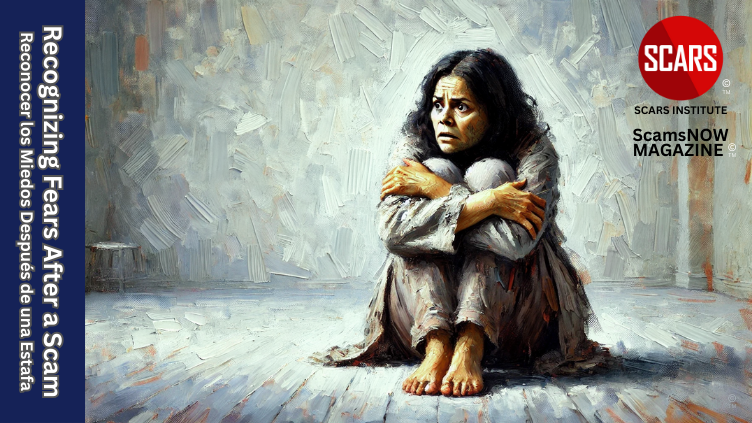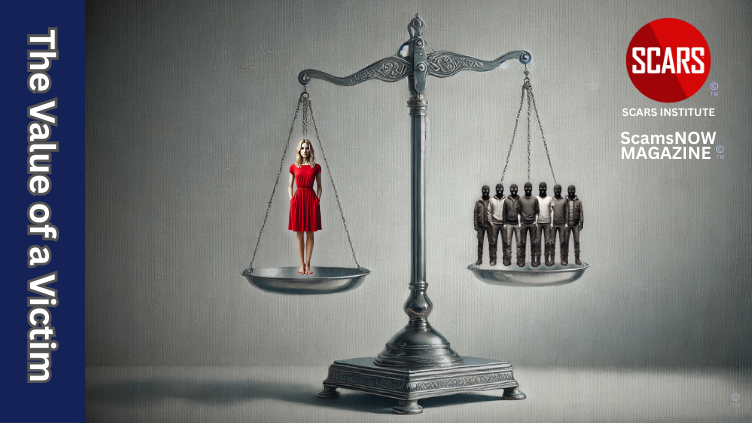For Every New Scam Victim Lost in a Fog After the Scam Ends – Surviving this Moment
When the Scam Ends: You Feel Lost and Living in the Fog
Primary Category: Scam Victim Recovery Psychology
Intended Audience: Scam Victims-Survivors
Author:
• Vianey Gonzalez B.Sc(Psych) – Licensed Psychologist, Specialty in Crime Victim Trauma Therapy, Neuropsychologist, Certified Deception Professional, Psychology Advisory Panel & Director of the Society of Citizens Against Relationship Scams Inc.

When the Scam Ends: You Feel Lost and Living in a Fog
You are the victim of a crime.
When a scam ends, you do not just lose money or trust. You lose a part of your world.
Everything feels strange and broken. You might not even recognize yourself at first.
This is a hard place to be, but you are not alone. What you are feeling is real and valid, and very normal, and there is a way through it.
Shock: The Silent Earthquake
At the end of the scam, shock hits you like an invisible earthquake.
You may feel numb one moment and flooded with fear the next. Your mind struggles to catch up with what happened.
It can feel like standing in the ruins of a house you thought was safe, realizing it was never real.
Shock is the mind’s way of protecting you.
It slows things down so you are not crushed by the full weight of the truth all at once.
If you feel frozen, dazed, or outside of yourself, it is because your brain is trying to give you space to survive the first blow.
Why Your Mind Feels Broken
After a scam, it can feel like your brain no longer works the way it should. Simple decisions feel impossible.
You forget things easily. You may have trouble focusing, reading, or even having a normal conversation.
This is called cognitive impairment. It is a normal response to extreme emotional trauma.
Your brain is trying to process overwhelming betrayal, loss, fear, and humiliation all at once.
It is like trying to run a marathon with a broken leg. You are not weak. You are injured. Your mind needs time and care to heal.
Living in a Fog
Many scam victims describe feeling like they are walking through a thick fog. Nothing seems clear.
Time feels distorted. Days blur together. You might sit for hours without realizing it. You might start things and never finish them.
This is cognitive dysfunction. Your brain is not broken permanently. It is overwhelmed.
Trauma floods the mind with stress chemicals that scramble normal thinking.
This fog is frustrating and frightening, but it is temporary. With proper professional support and healing, your mind will find clarity again.
When Two Realities Collide
One of the most painful parts of surviving a scam is living with cognitive dissonance.
This happens when your mind tries to hold two opposite conflicting ideas at once, such as the relationship and it being a scam.
Part of you still remembers believing the relationship was real. Believing the person cared for you. Trusting the lies.
Another part of you now knows the truth. That you were tricked. Betrayed. Used. That you are the victim of a crime.
These two realities crash into each other over and over.
It can feel like you are losing your mind. You are not.
This is an injury, you are not going crazy!
Your brain is trying to make sense of something that should never have happened.
Healing begins when you stop trying to erase one side or the other. Both experiences are part of your story now.
Accepting that you were deceived does not make you foolish or naive or gullible or stupid. It makes you human.
Feeling Numb and Fearful at the Same Time
After a scam, it is common to feel numb but also filled with fear. You might not cry. You might not scream. You might just sit there feeling like nothing matters, while a quiet terror hums underneath.
This numbness is another way your mind tries to protect you.
When pain is too big to handle all at once, your emotions shut down to help you survive.
But fear still leaks through. Fear of the future. Fear that you are ruined forever. Fear that you cannot recover.
You are not ruined. You are wounded. Wounds heal, even when it feels impossible.
Feeling Alone in a Sea of Despair
Loneliness after a scam is one of the worst kinds of loneliness.
It feels different from ordinary sadness.
You may feel like no one could possibly understand what you have been through. But we do!
You may be afraid to tell anyone, afraid of being blamed or judged.
You may even judge yourself harshly, adding shame on top of the pain.
This isolation feeds despair. But it is important to know this: you are not alone, even when it feels that way.
There are people who understand. Survivors like you. SCARS Institute support groups.
Also, Therapists trained to help traumatized scam victims. Help is real. It just takes reaching out when you are ready.
Lost in the Fog: Why Everything Feels Hopeless
The despair after a scam feels endless. It makes the future look black and heavy.
It whispers that nothing will ever get better. That you have no way out.
This is what trauma does. It clouds your vision. It paints the future with the colors of fear and blackness.
But despair lies.
It tells you the worst possible story and tries to convince you it is the only story. It is not.
Hope does not always come as a strong feeling. Sometimes it is just the smallest decision to keep breathing.
To take one more step. To believe that healing is possible even when you cannot feel it yet.
We call this “Fake it until you make it!”
What You Are Feeling Is Normal
You might wonder if you are going crazy. You are not.
What you are feeling is normal for someone who has been through what you have endured.
Shock. Numbness. Fear. Isolation. Confusion. Despair. These are not signs that you are broken. They are signs that you have survived something that should never have happened.
You are not weak. You are reacting the way a human being reacts to deep betrayal and loss.
Give yourself permission to feel what you feel without judgment.
Small Steps Out of the Darkness
Recovery does not happen all at once. It happens in tiny, messy, brave steps.
You do not have to know exactly where you are going right now. You just have to keep moving.
Reach out to someone you trust, even if it is just a text message or a short conversation. You can message us.
Give yourself permission to rest without guilt.
Eat something nourishing, even if you do not feel like it.
Write down your feelings, even if they do not make sense.
Allow yourself to cry or to sit quietly with your emotions.
Seek out safe professional support, whether it is from a support provider like the SCARS Institute, a therapist, or a trusted friend.
Each small step is a victory. Each one pulls you a little further out of the fog.
You Are Not Your Scam
It is easy to feel like the scam defines you. Like you are forever “the one who got tricked.”
But you are not your scam or fraud or crime. You are not your trauma. You are a whole person who survived a terrible experience.
Being victimized does not erase your worth, your intelligence, or your goodness.
It simply shows that you are human. No more, no less.
Axios – YOU are worthy!
There Is a Future Waiting for You
Right now, the future may look invisible and impossible. It may feel like nothing good could ever happen again.
That is the fog talking. Not the truth.
There is a future waiting for you that is not shaped by this scam. It will be shaped by the healing choices you make, one small step at a time.
You will not always feel this lost. You will not always feel this broken.
The pain you are in now is not where your story ends. It is just one chapter.
A Quiet Hope
Hope after trauma does not always roar. Sometimes it whispers. Sometimes it barely moves.
But it is there. It is in every breath you take. It is in every decision to keep trying, even when it feels impossible.
You are stronger than you know or feel right now.
You are more capable than you believe.
You are not alone, even when the darkness says you are. We are here for you!
And most importantly, you are worth the work of healing.
Final Words for This Moment
If all you can do today is breathe, that is enough.
If all you can do is survive this moment, that is an act of courage.
You are not broken beyond repair.
You are not lost beyond return.
You are standing in a hard, painful place, but you are still standing.
And that means hope is still alive inside you.
You have already survived more than you thought possible.
Healing is not just possible. It is waiting for you.
One breath, one step, one quiet hope at a time.
Now that You Understand All That – Understand This!
It Was Never Your Fault
One of the hardest things after a scam is the voice inside your head that says it was your fault. That you should have known better. That you were too trusting, too foolish, too blind.
That voice is wrong.
Being scammed was never your fault. It was the criminals’ fault.
Scammers are skilled manipulators. They are experts in emotional pressure, psychological tricks, and exploiting human kindness.
They work patiently, methodically, and relentlessly. They know exactly how to build trust and exactly how to break it when it serves their purpose.
You were targeted because you are human. Because you have a heart that wants to believe in others. Because you care, you trust, you love, and you hope.
None of that makes you foolish, naive, or stupid. It makes you good.
The shame you feel does not belong to you. It belongs to the one who chose to deceive you.
You did not invite betrayal. You did not create the cruelty that was used against you.
If you take anything with you today, let it be this: The scam was something done to you, not something you caused.
You are not to blame for someone else’s evil.
You are not defined by what they did.
You are defined by the strength you are showing right now, by surviving, by choosing to heal, by daring to believe that your life can be whole again.
You have nothing to be ashamed of. Only courage to honor.
It was NOT Your Fault!
I know, I was there too!
– Lic. Vianey Gonzales
Do you want to read the stories of other scam victims?
Visit www.ScamSurvivorStories.org
-/ 30 /-
What do you think about this?
Please share your thoughts in a comment below!
Important Information for New Scam Victims
- Please visit www.ScamVictimsSupport.org – a SCARS Website for New Scam Victims & Sextortion Victims.
- SCARS Institute now offers its free, safe, and private Scam Survivor’s Support Community at www.SCARScommunity.org – this is not on a social media platform, it is our own safe & secure platform created by the SCARS Institute especially for scam victims & survivors.
- SCARS Institute now offers a free recovery learning program at www.SCARSeducation.org.
- Please visit www.ScamPsychology.org – to more fully understand the psychological concepts involved in scams and scam victim recovery.
If you are looking for local trauma counselors, please visit counseling.AgainstScams.org
If you need to speak with someone now, you can dial 988 or find phone numbers for crisis hotlines all around the world here: www.opencounseling.com/suicide-hotlines
Statement About Victim Blaming
Some of our articles discuss various aspects of victims. This is both about better understanding victims (the science of victimology) and their behaviors and psychology. This helps us to educate victims/survivors about why these crimes happened and not to blame themselves, better develop recovery programs, and help victims avoid scams in the future. At times, this may sound like blaming the victim, but it does not blame scam victims; we are simply explaining the hows and whys of the experience victims have.
These articles, about the Psychology of Scams or Victim Psychology – meaning that all humans have psychological or cognitive characteristics in common that can either be exploited or work against us – help us all to understand the unique challenges victims face before, during, and after scams, fraud, or cybercrimes. These sometimes talk about some of the vulnerabilities the scammers exploit. Victims rarely have control of them or are even aware of them, until something like a scam happens, and then they can learn how their mind works and how to overcome these mechanisms.
Articles like these help victims and others understand these processes and how to help prevent them from being exploited again or to help them recover more easily by understanding their post-scam behaviors. Learn more about the Psychology of Scams at www.ScamPsychology.org
SCARS INSTITUTE RESOURCES:
If You Have Been Victimized By A Scam Or Cybercrime
♦ If you are a victim of scams, go to www.ScamVictimsSupport.org for real knowledge and help
♦ SCARS Institute now offers its free, safe, and private Scam Survivor’s Support Community at www.SCARScommunity.org/register – this is not on a social media platform, it is our own safe & secure platform created by the SCARS Institute especially for scam victims & survivors.
♦ Enroll in SCARS Scam Survivor’s School now at www.SCARSeducation.org
♦ To report criminals, visit https://reporting.AgainstScams.org – we will NEVER give your data to money recovery companies like some do!
♦ Follow us and find our podcasts, webinars, and helpful videos on YouTube: https://www.youtube.com/@RomancescamsNowcom
♦ Learn about the Psychology of Scams at www.ScamPsychology.org
♦ Dig deeper into the reality of scams, fraud, and cybercrime at www.ScamsNOW.com and www.RomanceScamsNOW.com
♦ Scam Survivor’s Stories: www.ScamSurvivorStories.org
♦ For Scam Victim Advocates visit www.ScamVictimsAdvocates.org
♦ See more scammer photos on www.ScammerPhotos.com
You can also find the SCARS Institute’s knowledge and information on Facebook, Instagram, X, LinkedIn, and TruthSocial
Psychology Disclaimer:
All articles about psychology and the human brain on this website are for information & education only
The information provided in this and other SCARS articles are intended for educational and self-help purposes only and should not be construed as a substitute for professional therapy or counseling.
Note about Mindfulness: Mindfulness practices have the potential to create psychological distress for some individuals. Please consult a mental health professional or experienced meditation instructor for guidance should you encounter difficulties.
While any self-help techniques outlined herein may be beneficial for scam victims seeking to recover from their experience and move towards recovery, it is important to consult with a qualified mental health professional before initiating any course of action. Each individual’s experience and needs are unique, and what works for one person may not be suitable for another.
Additionally, any approach may not be appropriate for individuals with certain pre-existing mental health conditions or trauma histories. It is advisable to seek guidance from a licensed therapist or counselor who can provide personalized support, guidance, and treatment tailored to your specific needs.
If you are experiencing significant distress or emotional difficulties related to a scam or other traumatic event, please consult your doctor or mental health provider for appropriate care and support.
Also read our SCARS Institute Statement about Professional Care for Scam Victims – click here
If you are in crisis, feeling desperate, or in despair, please call 988 or your local crisis hotline – international numbers here.
More ScamsNOW.com Articles
A Question of Trust
At the SCARS Institute, we invite you to do your own research on the topics we speak about and publish. Our team investigates the subject being discussed, especially when it comes to understanding the scam victims-survivors’ experience. You can do Google searches, but in many cases, you will have to wade through scientific papers and studies. However, remember that biases and perspectives matter and influence the outcome. Regardless, we encourage you to explore these topics as thoroughly as you can for your own awareness.















![NavyLogo@4x-81[1] For Every New Scam Victim Lost in a Fog After the Scam Ends - Surviving this Moment - 2025](https://scamsnow.com/wp-content/uploads/2025/04/NavyLogo@4x-811.png)









![scars-institute[1] For Every New Scam Victim Lost in a Fog After the Scam Ends - Surviving this Moment - 2025](https://scamsnow.com/wp-content/uploads/2025/04/scars-institute1.png)

![niprc1.png1_-150×1501-1[1] For Every New Scam Victim Lost in a Fog After the Scam Ends - Surviving this Moment - 2025](https://scamsnow.com/wp-content/uploads/2025/04/niprc1.png1_-150x1501-11.webp)